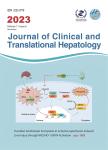HbA_(1C) as a Biomarker of Non-alcoholic Fatty Liver Disease: Comparison with Anthropometric Parameters
作者机构:Dow University of Health SciencesKarachiPakistan
出 版 物:《Journal of Clinical and Translational Hepatology》 (临床与转化肝病杂志(英文版))
年 卷 期:2021年第9卷第1期
页 面:15-21页
核心收录:
学科分类:1002[医学-临床医学] 100201[医学-内科学(含:心血管病、血液病、呼吸系病、消化系病、内分泌与代谢病、肾病、风湿病、传染病)] 10[医学]
主 题:NAFLD HbA_(1C) Biomarker Non-diabetic population Body weight measurements Body mass index(BMI) Waist circumference(WC)
摘 要:Background and Aims:Multiple non-invasive methods including radiological,anthropometric and biochemical markers have been reported with variable *** present study assessed glycosylated hemoglobin(HbA1C)as a biomarker to predict non-alcoholic fatty liver disease(NAFLD)and its severity,compared with body mass index(BMI),waist to hip ratio(WHR)and waist circumference(WC)Methods:This case control study included 450 individuals,including 150 cases and 300 age-and gender-matched controls recruited from the Dow Radiology Institute on the basis of radiological findings of fatty infiltration on abdominal ultrasound through convenient ***,WHR and WC were measured according to standard ***1C was determined by turbidimetric inhibition immunoassay Results:Among the cases and controls,66%and 32%had HbA1C levels higher than 5.7%***1C and BMI were significantly associated with NAFLD[crude odds ratio(cOR)=4.12,2.88,2.25(overweight)and 4.32(obese)].WC was found to be significantly associated with NAFLD for both genders(cOR in males=5.50 and females=5.79,p0.01).After adjustment for other parameters,HbA1C and WC were found to be significantly associated with NAFLD(aOR=3.40,p0.001)along with WC in males(aOR=2.91,p0.05)and in females(aOR=4.28,p0.05).A significant rise in severity of hepatic steatosis was noted with increases in HbA1C,BMI and ***1C possessed a positive predictive value of 76%for the study population[0.76,confidence interval(CI):0.715-0.809],70.6%for males(0.706,CI:0.629-0.783)and 80%for females(0.80,CI:0.741-0.858).Conclusions:Higher than normal HbA1C and WC measurements possess a more than 70%potential to predict *** is the single risk factor that is strongly associated with NAFLD after adjustment for indices of body ***1C may be presented as a potential biomarker for NAFLD in examination with other anthropometric measures in the adult population.



